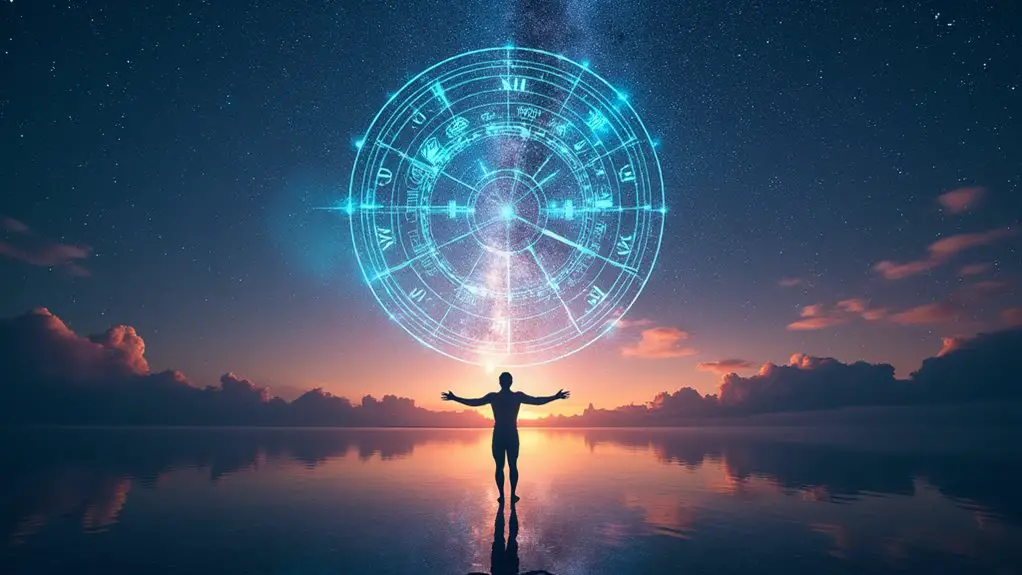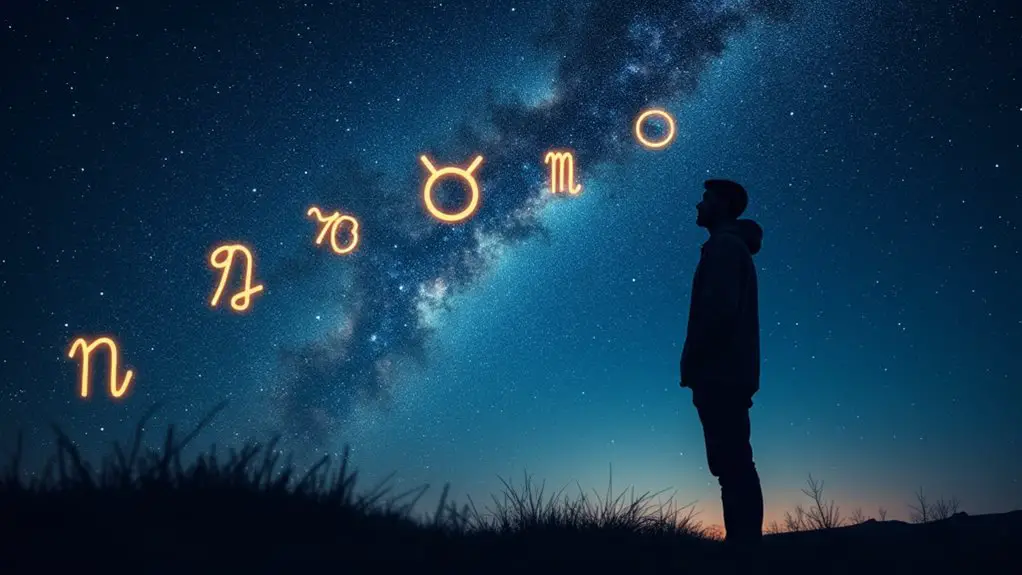Have you ever been captivated by the celestial movements and wondered if they hold a deeper meaning for your life?
Imagine this scenario: you are sitting with a group of friends, and one of them confidently predicts that you will encounter a life-changing opportunity within the next month. Intriguing, isn’t it?
This is the world of astrology, a system that seeks to understand human behavior and destiny through the study of celestial bodies. In this article, we will explore the question, ‘Is astrology a religious belief?’
Astrology has a rich history that spans across cultures and civilizations, with ancient societies using it to guide their daily lives. Today, astrology is often associated with spirituality and can be found in various religious traditions.
By delving into the origins, cultural significance, and religious associations of astrology, we will uncover its connections to faith and explore the debates surrounding its validity.
So, let’s embark on this journey and unravel the mysteries of astrology together.
Key Takeaways
- Astrology has a rich history and is found in various religious traditions.
- Astrology is often used as a tool for spiritual guidance and self-discovery.
- Astrology is associated with various religious practices around the world.
- Astrology lacks scientific validity but continues to be practiced and believed by many individuals.
Origins of Astrology
Astrology’s roots can be traced back to ancient civilizations, where the alignment of celestial bodies was believed to hold significance. The origins and development of astrology can be found in various ancient cultures, such as the Mesopotamians, Egyptians, and Greeks.
These civilizations observed the movement of the stars and planets and developed a system to interpret their influence on human affairs. However, it’s important to note that astrology isn’t considered scientifically valid by the mainstream scientific community. While it may have historical and cultural significance, astrology lacks empirical evidence to support its claims.
Nonetheless, astrology continues to be practiced and believed by many individuals today, as it offers a sense of guidance and understanding in their lives. Whether it’s seen as a religious belief or a pseudoscience, astrology remains a topic of interest and debate.

Cultural Significance of Astrology
Deeply ingrained in cultures around the world, astrology holds immense significance, captivating hearts and minds alike. Its cultural impact can be traced back to ancient civilizations such as the Babylonians and Egyptians, who believed that celestial bodies influenced human behavior and events on Earth.
Today, astrology continues to have contemporary relevance, with millions of people turning to horoscopes and birth charts to gain insight into their personalities, relationships, and life paths. It has become a popular topic of conversation, with astrology memes and social media accounts attracting large followings.
Moreover, astrology has influenced various aspects of popular culture, including music, fashion, and art. Its ability to provide comfort, guidance, and a sense of belonging in an unpredictable world contributes to its enduring popularity and cultural significance.
Astrology in Ancient Civilizations
In ancient civilizations like Babylon and Egypt, celestial bodies were seen as powerful forces that shaped human behavior and influenced events on Earth. Astrology played a significant role in their societies, as people believed that the positions and movements of the stars and planets had direct effects on their lives.
These ancient civilizations developed complex systems of astrology, using observations and calculations to predict future events and provide guidance for individuals. While astrology was widely accepted and practiced during those times, its significance and popularity have evolved over the centuries.
In modern society, astrology is often viewed with skepticism by the scientific community. Critics argue that there’s a lack of scientific evidence to support the claims made by astrologers. Nevertheless, astrology continues to have cultural significance and remains a topic of interest for many people seeking guidance and understanding in their lives.
Astrology and Spirituality
Explore how astrology can enhance your spiritual journey and provide insight into your inner self and higher purpose.
Astrology has long been used as a tool for spiritual guidance, helping individuals connect with the cosmic energies that surround them. By studying the positions and movements of celestial bodies, astrologers believe they can gain a deeper understanding of the universe and its influence on our lives.
Through astrology, you can gain insight into your personality traits, strengths, and weaknesses, allowing you to embark on a journey of self-discovery and personal growth. Additionally, astrology can help you uncover your higher purpose and align your actions with your true calling.
By recognizing and working with the cosmic energies at play, astrology can be a valuable tool in your spiritual quest for meaning and fulfillment.
Religious Beliefs Associated with Astrology
Religious beliefs intertwine with astrology, providing a spiritual framework that connects individuals with cosmic energies and guides their journey of self-discovery and personal growth.
Astrology has deep cultural roots and is associated with various religious practices around the world. In ancient civilizations such as Mesopotamia, Egypt, and India, astrology was considered a sacred science that played a significant role in religious rituals and divination.
However, it’s important to note that astrology is not scientifically validated and is often regarded as pseudoscience by the scientific community. While many individuals find solace and meaning in astrology, it’s essential to approach it with a critical mindset and understand that its claims lack empirical evidence.
Ultimately, the association between astrology and religious beliefs is subjective and varies among different cultures and individuals.
Astrology and Personal Beliefs
As individuals navigate their personal journeys, they’re captivated by the cosmic tapestry that weaves together their deepest convictions and guides their path.
When it comes to astrology, personal beliefs play a significant role in shaping one’s perspective. Cultural influences, for example, can heavily impact how individuals view astrology. Some may see it as a deeply ingrained part of their cultural heritage, while others may view it as a pseudoscience.
Scientific validity is another factor that individuals consider when forming their personal beliefs about astrology. While some may view astrology as an ancient wisdom passed down through generations, others may question its scientific basis.
It’s important to recognize that personal beliefs about astrology can vary greatly depending on cultural and scientific influences.
Astrology and Divination Practices
Indulge yourself in the captivating world of astrology and discover the mind-blowing divination practices that can give you a glimpse into your future.
Astrology, the study of celestial bodies and their influence on human affairs, has been practiced for centuries. While some may dismiss astrology as mere superstition, others find value in its ability to provide guidance and insight.
Scientific research on astrology is limited, with many studies showing inconclusive results. However, astrology continues to find modern applications in various fields such as psychology, self-improvement, and even business.
Many individuals turn to astrology for self-reflection and personal growth, using birth charts and horoscopes as tools for understanding themselves and their relationships. Whether you believe in its accuracy or not, astrology offers a unique perspective on life and can be a source of inspiration and reflection for those who explore its principles.
Astrology and Fate
Explore the captivating world of astrology and its connection to fate, as it offers a unique perspective on the influence of celestial bodies on our lives. While astrology suggests that the position of the stars and planets at the time of our birth determines our fate, it raises questions about the balance between fate and free will.
Here are four key points to consider:
- Fate vs. Free Will: Astrology suggests that our lives are predetermined by the positions of celestial bodies, implying a lack of free will. However, skeptics argue that we have the power to shape our own destiny through our choices and actions.
- Interpretation and Personal Belief: The way astrology is interpreted varies among individuals, leading to different beliefs about its influence on our lives. Some see it as a guiding force, while others view it as mere entertainment.
- Scientific Validity: Astrology lacks scientific evidence and falls short in meeting the criteria of a scientific theory. The predictions made by astrologers often rely on generalizations and vague statements, making it difficult to prove its accuracy.
- Personal Experience: Many individuals claim to have had personal experiences that support the accuracy of astrology. While these anecdotes may be convincing, they do not provide scientific proof or validation.
Astrology offers an intriguing perspective on the influence of celestial bodies on our lives. However, the debate between fate and free will, as well as the lack of scientific validity, raises questions about its credibility. It ultimately comes down to personal belief and individual interpretation.
Astrology and Free Will
In the vast tapestry of life, the celestial dance of the stars and planets intertwines with our own choices, allowing us to navigate the mysterious labyrinth of destiny.
When it comes to astrology and free will, the question arises: does astrology determine our fate, or do we have the power to shape our own lives? Some argue that astrology is deterministic, suggesting that our actions and decisions are predetermined by the alignment of celestial bodies at the time of our birth.
However, astrology can also be seen as a tool for self-reflection and personal growth. By understanding the psychological impact of astrological interpretations, individuals can gain insights into their strengths, weaknesses, and patterns of behavior.
Ultimately, astrology provides a framework for understanding ourselves and our place in the universe, but it’s up to us to exercise our free will and make choices that align with our desires and values.
Astrology and Compatibility
Immerse yourself in the fascinating world of astrological compatibility and discover how the alignment of the stars can influence your relationships. Astrology has long been used as a tool to understand and predict compatibility between individuals.
By analyzing the positions of celestial bodies at the time of your birth, astrologers can determine your personality traits and how they may interact with those of your partner.
Astrology and relationships go hand in hand, as it offers insights into the dynamics and potential challenges that may arise within a partnership. For example, if you’re a fiery Aries and your partner is a practical Taurus, astrology can shed light on how your contrasting personalities may complement or clash with each other. It can help you understand each other’s needs, communication styles, and potential areas of conflict.
While astrology can’t guarantee a successful relationship, it can serve as a valuable tool for self-reflection and understanding. By exploring astrological compatibility, you can gain insights into your own strengths and weaknesses, as well as those of your partner. This knowledge can help foster better communication, empathy, and a deeper connection in your relationships.
Astrology and Self-Reflection
Delving into the world of astrology is like peering into a mirror that reflects our inner selves, allowing us to gain a deeper understanding of our own strengths and weaknesses.
Astrology provides a framework for self-discovery and introspection, offering individuals an opportunity to explore their personalities, motivations, and potential. By examining the positions of celestial bodies at the time of our birth, astrology suggests that these cosmic alignments can influence our character traits and life experiences.
It encourages us to analyze our behaviors and patterns, helping us identify areas where we excel and areas where we may need to improve. Astrology holds the belief that by understanding ourselves better, we can make more informed decisions and lead more fulfilling lives.
It serves as a tool for personal growth and self-reflection, offering insights that can aid in our journey towards self-improvement and self-acceptance.
Criticisms and Debates Surrounding Astrology
Explore the criticisms and debates surrounding astrology, as they challenge your preconceived notions and invite you to consider alternative perspectives on the subject.
One of the main criticisms of astrology is its lack of scientific validity. Skeptics argue that there is no empirical evidence to support the claims made by astrologers, and that astrology relies on vague and generalized statements that could apply to anyone.
Additionally, astrology’s predictions are often seen as too broad and can be interpreted in multiple ways, making them difficult to verify. Another point of contention is astrology’s modern-day popularity, despite being labeled as a pseudoscience. Critics argue that its popularity is rooted in a desire for guidance and validation, rather than any proven accuracy.
While astrology may hold personal significance for some, it is important to approach it with a critical mindset and consider the scientific evidence before accepting its claims.

Frequently Asked Questions
How accurate is astrology in predicting future events?
Can astrology accurately predict future events? While astrology can provide insights and guidance, its accuracy is limited. Factors such as human free will and external circumstances play significant roles, making precise predictions challenging.
Can astrology be used to determine someone’s personality traits?
Astrology can provide insights into someone’s personality traits by analyzing their birth chart. By examining the positions of celestial bodies at the time of their birth, astrologers can determine characteristics that may influence their relationships and overall character.
Is there any scientific evidence to support the claims of astrology?
Scientific research has found no credible evidence to support the claims of astrology. Skepticism towards astrology is justified as it lacks empirical evidence and relies on subjective interpretations.
Are there any specific rituals or practices associated with astrology?
Astrology rituals and practices encompass various customs like chart readings and horoscope consultations. They serve as tools to unravel the mysteries of the stars and planets, providing guidance and insight into one’s life and future.
Can astrology be used as a tool for making important life decisions?
Astrology can be used as a tool for making important life decisions, such as career choices and relationship compatibility. By analyzing planetary positions and their influence, individuals can gain insights and make informed decisions.
Conclusion
In conclusion, astrology has been a widely practiced and culturally significant belief system for centuries. Its origins can be traced back to ancient civilizations, where it was intertwined with religious beliefs and spirituality. While astrology may not be considered a traditional religion, it holds a special place in the hearts and minds of many individuals who use it as a tool for self-reflection and understanding.
Despite the criticisms and debates surrounding astrology, its impact on individuals’ lives cannot be denied. Whether you believe in its validity or not, astrology continues to intrigue and captivate people with its ability to provide insight and guidance into their lives.



